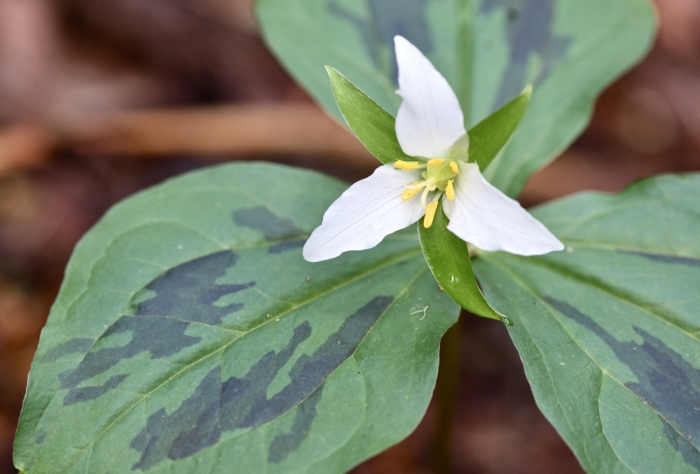Pacific Trillium
(Trillium ovatum)
Pacific Trillium (Trillium ovatum)
/
/

Karen and Mike
CC BY 4.0
Image By:
Karen and Mike
Recorded By:
Copyright:
CC BY 4.0
Copyright Notice:
Photo by: Karen and Mike | License Type: CC BY 4.0 | License URL: http://creativecommons.org/licenses/by/4.0/ | Rights Holder: Karen and Mike | Publisher: iNaturalist | Date Created: 2020-03-15T14:25:01-07:00 |






















































Estimated Native Range
Summary
Trillium ovatum, commonly known as Pacific Trillium, is a deciduous perennial herb that is native to moist, rich, well-drained soils in the understory of coniferous and mixed deciduous-coniferous forests in the Western USA and Canada. It is the most widespread of the western North American trilliums and exhibits significant variation within its range. The plant typically grows to a height of 20 to 50 cm (8 to 19.5 in) and is characterized by its solitary, three-petaled flowers and whorl of three leaves. The flowers are initially white and gradually transition to pink or even a deep barn-red, particularly in the Smith River Canyon area. The flowering season spans from late winter to early spring, and the blooms are moderately showy, attracting pollinators such as bees.
Pacific Trillium is valued for its delicate flowers and is often used in woodland gardens, shade gardens, and naturalized areas. It is relatively low-maintenance, requiring minimal care once established. For successful cultivation, it prefers partial to full shade, consistent moisture without waterlogging, and rich, acidic to neutral soil. While it is not prone to serious pest or disease problems, over-collection from the wild and habitat destruction are threats to its populations. It is important to source plants from reputable nurseries that propagate them responsibly. Pacific Trillium is not known for aggressive roots or invasiveness, but it can slowly form colonies over time through its rhizomes, adding to the charm of a natural garden setting.CC BY-SA 4.0
Pacific Trillium is valued for its delicate flowers and is often used in woodland gardens, shade gardens, and naturalized areas. It is relatively low-maintenance, requiring minimal care once established. For successful cultivation, it prefers partial to full shade, consistent moisture without waterlogging, and rich, acidic to neutral soil. While it is not prone to serious pest or disease problems, over-collection from the wild and habitat destruction are threats to its populations. It is important to source plants from reputable nurseries that propagate them responsibly. Pacific Trillium is not known for aggressive roots or invasiveness, but it can slowly form colonies over time through its rhizomes, adding to the charm of a natural garden setting.CC BY-SA 4.0
Plant Description
- Plant Type: Herb
- Height: 1-2 feet
- Width: 0.5-1 feet
- Growth Rate: Slow
- Flower Color: White, Pink
- Flowering Season: Spring
- Leaf Retention: Deciduous
Growth Requirements
- Sun: Part Shade, Full Shade
- Water: Medium
- Drainage: Slow, Medium, Fast
Common Uses
Bee Garden, Deer Resistant, Edible*Disclaimer: Easyscape's listed plant edibility is for informational use. Always verify the safety and proper identification of any plant before consumption., Fragrant, Low Maintenance, Water Garden
Natural Habitat
Moist, rich, well-drained soils in the understory of coniferous and mixed deciduous-coniferous forests
Other Names
Common Names: White Trillium, Western Trillium, Western Wakerobin, Western White Trillium, Coast Trillium, Coast Wake-Robin, Trille À Feuilles Ovées, Mysktreblad
Scientific Names: , Trillium ovatum,
GBIF Accepted Name: Trillium ovatum Pursh